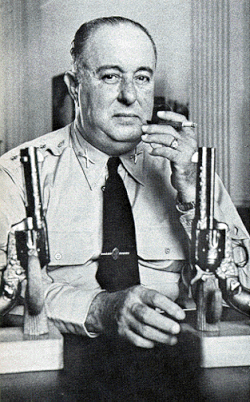Leonardo Murillo
This article is incomplete because it is pending further input from participants, or it is a work-in-progress by one author. Please comment on this article's talk page to share your input, comments and questions. Note: To contribute to this article, you may need to seek help from the author(s) of this page. |
El Caudillo Leonardo Murillo | |
|---|---|
 | |
| Caudillo of Montilla | |
| In office 27 April 1945 – 11 December 1958 | |
| Preceded by | Arturo Guillén (as president) |
| Succeeded by | Miguel Guerra (as president) |
| Personal details | |
| Born | Leonardo Arrabal Cruz Murillo 21 August 1898 San Marcos, Isla del Sal, Montilla |
| Died | 12 December 1958 (aged 66) Guaitiao, Montilla |
| Cause of death | Summary execution |
| Resting place | Museo del Fascismo, Guaitiao, Montilla |
| Political party | National Renewal Alliance |
| Spouse | Eva Sainz |
| Children | |
| Parents | |
| Profession | Politician |
| Nicknames |
|
| Military service | |
| Allegiance | |
| Branch/service | Montillan Army |
| Years of service | 1945-1958 |
| Rank | Generalissimo |
| Battles/wars | Montillan Revolution |
Leonardo Arrabal Cruz Murillo (21 August 1898 - 12 December 1958) was a Montillan dictator who founded and led the National Renewal Alliance (ARENA). He was the Caudillo of Montilla from the Guaitiazo in 1945 until his summary execution following the Montillan Revolution in 1957. As the ruler of Montilla, Murillo is regarded as the deadliest figure in the history of the country, heading the Years of Desolation and overseeing the systematic persecution of minorities and political opposition.
Murillo was born in San Marcos del Sal, youngest son of a very wealthy sugarcane planter. He graduated with a journalism degree from the University of Guaitiao and was employed as an assistant broadcaster at Rádio Lunisolar in 1921, at the time the largest radio station in the country. Murillo gradually took a role of protagonism in the radio, considered to be charmimg and a "natural-born entertainer" by his peers, he received his own radio program in 1931, the Hora de los Hechos.